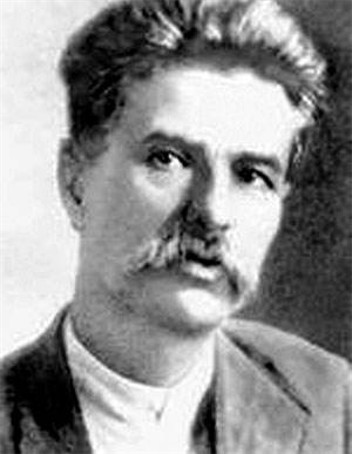Yefremov, Serhii
Yefremov, Serhii [Jefremov, Serhij] (Iefremov), b 18 October 1876 in Palchyk, Zvenyhorodka county, Kyiv gubernia, d 31 March 1939 in Vladimir prison, RSFSR. Literary journalist, historian, critic, and political activist; member of the Shevchenko Scientific Society from 1923 and the VUAN from 1919; brother of Petro Yefremov. He studied law at Kyiv University before devoting himself to literary scholarship. He was a leading member of the Ukrainian Democratic Radical party and its successor, the Society of Ukrainian Progressives (TUP), which he transformed into the Ukrainian Party of Socialists-Federalists (and then headed). His contributions on political and literary topics to publications such as Zoria (Lviv), the journal Pravda, Zapysky Naukovoho tovarystva im. Shevchenka, Literaturno-naukovyi vistnyk, Kievskaia starina, the monthly Nova hromada, Hromads’ka dumka, Rada (Kyiv), Nova rada (Kyiv), Ukraïna (1914–30), Zapysky Istorychno-filolohichnoho viddilu VUAN, and Literatura were highly regarded. Yefremov served as vice-president of the VUAN governing council, secretary of its historical-philological division, and member of many of its commissions (notably the commission for publishing the classics of modern Ukrainian literature). He was also one of the directors of the Vik publishing house (1895–1918). He suffered several arrests under the tsarist regime for his writings and political activity.
In 1917 Yefremov became a member of the Central Rada and its deputy head, a member of the Little Rada, general secretary of international affairs in the General Secretariat of the Central Rada, and a member of the Ukrainian delegation that negotiated with the Provisional Government. Yefremov was the chief defendant in the 1929 show trial of the so-called Union for the Liberation of Ukraine (SVU), which he was accused of heading. The death sentence he received in 1930 was later commuted to 10 years' imprisonment. He served the first seven of those in the Yaroslavl political prison and the remainder in the Vladimir prison. He died several months before the end of his sentence.
As a literary critic Yefremov was the most prominent representative of the late populist or neopopulist current, which, despite fierce criticism from those who stressed the primacy of sociological or esthetic criteria, enjoyed widespread support during the revolutionary years and still exerts an influence today. Claiming that the esthetic principle was completely inappropriate for a history of Ukrainian literature, he outlined three governing ideas in the development of that literature: (1) ‘the element of personal freedom, a continuous emancipatory current’; (2) ‘the idea of national liberation’; and (3) ‘the progressive populist current in content and form’. Using service to the nation and norms of the literary language as criteria upon which to judge literature, Yefremov placed little value on the writing of the 17th and 18th centuries, which he considered artificial, scholastic, and divorced from ‘real life.’ He concentrated his attention on the history of modern literature, in which field he published a series of important monographs, chiefly on writers of the 19th century: Marko Vovchok (1907), Shevchenko (1914), Spivets’ borot’by i kontrastiv (Singer of Struggle and Contrasts 1913; Ivan Franko in the 1926 edition), Mykhailo Kotsiubyns’kyi (1922), Karpenko-Karyi (1924), Ivan Nechui-Levyts’kyi (1925), and Panas Myrnyi (1928). He is responsible for editing many classics of Ukrainian literature (again primarily of the 19th century), for which he provided introductions and notes: by Leonid Hlibov, Yevhen Hrebinka, Taras Shevchenko, Oleksander Konysky, Ivan Kotliarevsky, Mykhailo Kotsiubynsky, Borys Hrinchenko, and others. One of his most important publications is the academic edition of Shevchenko's Diary and Letters (1927–8), which contain Yefremov's articles and commentary.
In an article that appeared in Kievskaia starina in 1902, Yefremov voiced his hostility toward the modernists. Using the works of Hnat Khotkevych, Olha Kobylianska, Nataliia Kobrynska, Katria Hrynevycheva, and others as examples, Yefremov condemned what he regarded as ‘modish currents,’ ‘caricaturish form,’ enthusiasm for symbolism and decadence, and, above all, a failure to delve deeply into life in order to ‘expose social sores’ and heal them. In the 1924 edition of his Istoriia ukraïns’koho pys’menstva (History of Ukrainian Writing) Yefremov devoted a new chapter to the ‘revolutionary’ literature of 1919–24 in which he modified his populist methodology by accepting the importance of formal considerations, and made insightful comments on Soviet writers. From the 1930s Soviet literary criticism never acknowledged Yefremov's contributions to literature and wrote practically nothing about him. Yefremov's views on literature are most fully expressed in his Istoriia ukraïns’koho pys’menstva (1911), the third edition (1917) of which became the most widely read literary-scholarly work of the revolutionary years. Yefremov’s diaries from 1923 to 1929, confiscated after his arrest, were published in Kyiv in 1997.
BIBLIOGRAPHY
Kryms’kyi, A. ‘Zhyttiepys i literaturna diial’nist’ S.O. Iefremova,’ ZIFV, 2–3 (1920–3)
—’Spys prats' Iefremova,’ ibid
Ovcharenko, M. ‘Serhii Iefremov iak literaturoznavets',’ ZNTSh, 173 (1962)
‘Do stolittia narodzhennia Serhiia Iefremova,’ Suchasnist’, 1976, no. 10 (three articles by P. Odarchenko, Iu. Boiko, and H. Hrabovych)
Ivan Koshelivets, Myroslav Shkandrij
[This article originally appeared in the Encyclopedia of Ukraine, vol. 5 (1993).]
.jpg)
.jpg)
.jpg)

.jpg)